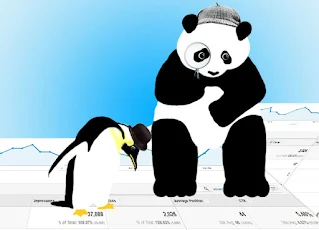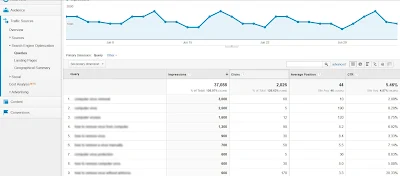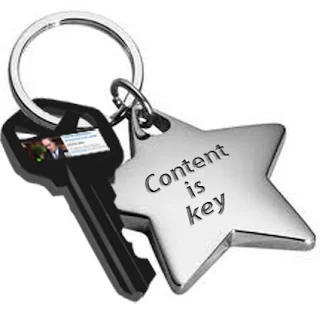A Rank On the First Page Brings More Targeted Traffic & Better Odds Your Web Site Content Will Go Viral
With more people that are possibly your targeted traffic clicking on the first page of search results, there's no question as to if being on page one for the words related to your niche are a key to bring better chances for your website articles, blogs, vlogs, or products to go viral and grow a fan base or customer base.
However, we can't just jump right into learning about keywords as there are other factors that can cause search engine penalties that need to be considered first. Search engine penalties will prevent any new customers from finding your content in the search results.
If you want to increase web site traffic, but you don't want to worry about search engine penalties, you first need to understand the top search engines algorithms.
You need to understand the various ways site analytics obtained by a view contribute to that rank on first page, and how to get views that will be beneficial to your site's analytics to please the search algorithms.
Organic SEO uses white hat SEO methods that can help you learn how to improve your analytics to accommodate the top search engines to improve search engine ranking for your web page with the possibility to grow a fan base. It is also a requirement for any successful e-business to implement if they want to get a SERP on page 1.
Having a webpage article, blog, vlog, or product rank on the first page of search results so that you can increase website traffic is the ultimate goal of every Internet entrepreneur. However, a page rank on page one of search results is much easier said than done, unless you happen to know how the SERP (search engine results page) is determined by the search engine's algorithms.
The white hat organic SEO (search engine optimization) techniques to accommodate the Penguin, Panda, and other algorithms from other major search engines I've shared in previous articles, as well as the SEO tips I'm about to disclose here, discuss these requirements of the search algorithms and more.
 |
| Google's penguin and panda are investigating analytics throughout the web, here's how to meet the analytical requirements to keep your e-business at the top of the search results | Source Copyright © 07/11/2013 |
How Traffic from Visitors Contribute to Search Engine Ranking on the Top Search Engines, & Article Based Communities
When you want to increase website traffic, you don't want it to be short lived, which is usually what you get from cheap SEO services and some automated SEO products.
Even though you can get more traffic being on page one of search results, you want to make sure the visitors are your target market.
When you don't want to provoke any search engine penalties in the process of trying to increase web site traffic, you are going to want to make sure your site or blog provides great customer service. Great customer service will improve your site analytics.
It's important to learn about the several interesting ways that data collection such as; click through rate (CTR) calculations, bounce rate, amount of visits overall, and the amount of recurring and unique views your web page receives, altogether make up your site analytics which contribute to your page rank.
Let me stress that again because this is the number one reason why SERP falls into the sandbox. All the visits a web site receives contribute to that page one SERP via web analytics. They will determine whether your site's contents will get on page 1 of search results based on keywords related to your niche, and give you the bonus opportunity to grow a fan base or customer base, and be viral-able.
Low CTR and High Bounce Rate on Site Analytics Bringing Your Page Rank Down?
Getting more visitors to your webpage article, vlog, or blog is great as long as the visitors stick around to read or view your web page and possibly become regular customers, readers, or viewers of your audience by joining your fan base or customer base. However, a quick view will not be good enough for your web analytics or the search algorithms that are checking your analytics, and that is why targeted traffic is so important to your SERP.
See, the search algorithms look at your web analytics click through rate to see how long your visitors stick around to ensure that your articles, blogs, vlogs, or products are not spam and are what the viewers or readers who visit your site want. With that said it should be clear that the type of traffic you get on your website is a big deal, and you don't want just any traffic, you want targeted traffic when you increase website traffic.
Targeted traffic visits come from viewers and readers who are searching for entertainment, information, products, etc. based on a particular topic or key word and have arrived on your page to receive that keyword related information, entertainment, etc. As long as the content they landed on is truly related to the words or phrases searched for and not spam-like, those visits will be more long lasting.
The CTR (click through rate) from those visitors tend to be higher. A high click through rate is calculated by the amount of clicks you get per impression on the search results page, in laments terms, the more times your content gets clicked when the search engines display your page in their results.
A high CTR will accommodate the algorithms criteria better, as well as be more likely to please your readers or viewers. They will then be more likely to share your website article, blog, or vlog, giving your articles, blogs, vlogs, or products a better opportunity to grow your customer base or fan base, and go viral, which could increase web site traffic to improve the other analytic factors that top search engines use to rank and place your page to get on the first page of search results.
If you have a low click through rate and high bounce rate, meaning the reader or viewer clicked off of your site's article, blog, or vlog just as quickly as they arrived, and you haven't had many clicks to your site, the algorithms will take that to mean that your web site is not what the viewers or readers are looking for and may even consider it as spam.
If the traffic to your webpage was acquired through a search based on a keyword or key phrase and you have a low CTR or high bounce rate from those visits, the search engine algorithms will punish your webpage by diminishing your ranking for the keyword or key phrase used in the searches that brought viewers to your site. The SEO tips I discussed in the viral content web series as well as my key word SEO tips will be vital to prevent your CTR from getting to low and bounce rate from getting too high to help you achieve and even succeed the picture below (sorry the keywords are blurred to protect against black hatters).
 |
| Organic SEO will bring you a click through rate like this or better with thousands of impressions, hundreds of hits, and so much more. | Source |
Improve Analytics With More Targeted Traffic from Targeted Keywords
Search algorithms don't just take into account how many visits (unique and recurring views) your web site article, blog, or vlog receive from social media platforms as well as search engines results, or article based communities' search results.
The major search engines, HubPages, and any other article based communities you may be publishing or producing videos on for a particular keyword or key phrase take a look at the number of hits (views) your page's link receives on various links across the web and the search results for the particular key words and key phrases and then compares it to the hits of your competitor's pages that are related to those keywords and key phrases.
The more targeted visits you get (whether they come from search results or links on the various social networking platforms such as facebook), that provide low bounce rate and high CTR for your web site's analytics, the better the page rank, and in the case of HubPages, the better the hub score you will have. However, if your competition is getting more quality hits they will out rank you.
This means that you have to tap into your creativity to create a title and summary of your web page contents for the major search engines to display in the search results that will grab the attention of the audience searching for the key words you are trying to rank for.
You'll want to make sure that the title clearly tells the visitor what they should expect from the contents of that web page, and the page itself delivers that promise. Doing so is sure to increase web site traffic from a target market to get on page one of the top search engines and you will not have to worry about search engine penalties.
Of course that also means making sure the search engines know the title of the content, and are given a description of what the content is about by use of meta tags and structured data within the html source code. Depending on the content, you may need several different meta tags and structured data tags to help improve your serp.
Moreover, you should keep your titles short and sweet (same as the summary, which I discussed a bit about in my web series on making content go viral). Try to keep your title at around 60 characters in length, as the major search engines will cut off your title after 60 characters (which includes spacing and punctuation).
Key words or key phrases are great to use in titles, helping you to reach a target market interested in such words, however the top search engines could penalize your page for using too many. Hence you should try to refrain from using more then two keywords or key phrases in your titles.
Unique and Recurring Views Are Not Just Meaningless Data Collection
The major search engine algorithms also check the viralbility of blogs, vlogs, e-commerce products, etc. by the data collection of recurring and unique views (clicks) on your page's link. When they look at clicks from search results they look at particular key words or keyphrases used in the search and if the visitor has ever been to your site before.
This data also helps you to see the virality of the page as the amount of unique and recurring views provides insights on how your customers or audience rate the information, videos, or products you are providing.
 |
Driving more website traffic than rush hour. | Source |
The amount of recurring visitors who have been to your site before because of searching for those keywords previously are then compared to the amount of unique and recurring views received on other (competitor) site links per a given day for the same key words and key phrases. This comparison helps the top search engines determine how relevant the audience or customers consider your videos, products, etc to be in regards to what the visitor was searching for.
It can't be stressed enough to say that when the visitor discovers your page you need to make sure it provides or exceeds their expectations on what they are searching for.
You will increase the likely-hood that they will join your fan base or customer base and return, maybe even share your products, videos, blogs, or curated content with friends and family.
Therefore increase web site traffic for both unique and recurring views by providing new content and keeping content up to date, which affects your page rank on the search results of the major search engines and/or article based communities, and how high your hub score is.
The key to make sure your views are beneficial to your page rank is to make sure that at very least you meet the viewer's expectations, though if you always try to exceed expectations you will see more benefits in regards to views, page rank, virality, and have a much better opportunity to get on page one of the search engines.
How to Target a View to Improve Search Engine Ranking & Web Analytics
Now that you know how a view contributes to your page's analytics and your search engine rank it's time to learn how to reach out to your target market starting with website promotion. Website promotion is the third best way to improve search engine ranking (the first being keyword research, and second being content optimization) to make your page go viral. However, it's important to know that algorithms also base where your site is placed in search results on the type of website promotion you do.
There are two main types of free website promotion, which would be offline promotion via more word of mouth, and online promotion via backlinks. The online website promotion is the one you have to be careful with, as it can either boost your SERP or cause the search engine algorithms to penalize your page.
There's too much information in regards to online promotion and how the search engine algorithms use your online promotion to determine your search engine rank placement to include here. However, I have written some SEO tips on how to backlink so that you don't get a search penalty in another hub (which you can check out by clicking the colored link at the beginning of this sentence, or by checking out my other articles on my HubPages profile).
Comments
Post a Comment
To try to prevent bot spam I hope you don't mind doing the captcha. Thanks for your comment!